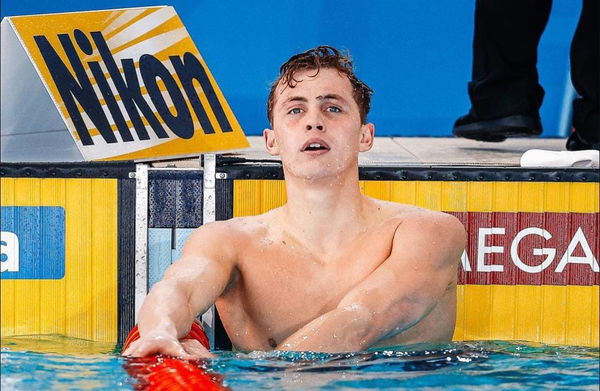

Traveling to the Olympics is quite a physically and mentally tough experience and oftentimes the pressure of the accompanying expectations bears heavily on the athletes. Ohio swimmer Carson Foster discussed a personal challenge that many athletes go through but rarely talk about. He felt stifled and inadequate Foster and even made allusions to how he couldn’t handle it in real time with the needed grace and tact. He is competing for Team USA in Paris and shared candidly about a big self-doubt incident.
Foster disclosed that he struggled with mental health concerns, leading him to wonder about his talents in comparison to Olympic heroes like Ryan Lochte and Michael Phelps in the run-up to the 2024 Summer Olympics in Paris. This open admission puts the spotlight on the mental struggles that professional athletes face but are frequently disregarded for. What did Foster delve into and how did his self-doubt episode compound to his mental health woes?
ADVERTISEMENT
Article continues below this ad
Carson Foster is yet another victim to the pangs of mental detriment
Carson Foster struggled with self-doubt despite his stellar record and went public about the same and even mentioned failing to measure up to the likes of the big guns. “Why can’t I just step up and race like I’ve seen Michael Phelps do or Ryan Lochte do or all these guys? They always seem to just have it. At that point, I was like, why don’t I just have it in big moments,” Foster remarked in a tête-à-tête with WDSU.com. His words capture the struggles of players, who frequently experience extreme pressure to perform accurately.

However, Foster acknowledged that it was difficult to seek assistance. “I was like, I don’t want to do that. Like, I’m embarrassed to do that ” – he exclaimed rather poignantly, being scared of being vulnerable. In the high stakes sporting world, self preservation and being vocal about one’s plight is all the more important for longevity. But, with demanding routines and exceeding expectations, overthinking and mental health detriment do set in. “If I do it, I don’t want anyone to know. Just because at that time, I didn’t know anyone who did it, and I felt like I was like, why can’t I just do this on my own?” Foster questioned his drive and resolve to overcome it in his own stead.
ADVERTISEMENT
Article continues below this ad
Furthermore, many athletes encounter this unwillingness to ask for support, as they think they should be able to manage their problems on their own. Foster’s experience shows the negative stereotypes linked to mental health in sports. Athletes may be discouraged in getting the assistance they require if they believe they are invulnerable. However, even icons like Michael Phelps have gone through such a difficult time and has since emerged a harbinger.
What’s your perspective on:
Is Carson Foster the next Michael Phelps, or are we setting the bar too high?
Have an interesting take?
Michael Phelps’s thoughts on depression and everything that eats at someone’s mental edifice
The most decorated Olympian in history, Michael Phelps, has openly discussed his battles with depression. Given Phelps’ honesty about his mental health, players like Foster can now seek therapy without feeling ashamed. Phelps used to believe that his depressive symptoms were a sign of weakness. In a conversation, Phelps stated, “I think at that point I’ll say as a male athlete I could tell something was off.” He thought that by disclosing his difficulties, his rivals would be at an advantage. And wrong, he definitely was. That’s how overthinking seeps in and does to a top level athlete which goes to show how undiscriminatory the tide is.
ADVERTISEMENT
Article continues below this ad
Moreover, Phelps’ battle with depression reached a low point in 2014 when he thought about taking his own life. The tipping point was him driving under the influence and the subsequent arrest and suspension that followed. Phelps, struggling with his mental state, spent four days sequestered in his bedroom. However, Phelps understood the value of being vulnerable and asking for assistance after thinking back on this arduous time, as he had a battalion of people and kith and kin to support him in solidarity. “I had to learn that vulnerability is a good thing,” Phelps noted. “And it was scary at first, but I learned that vulnerability just means change. And for me, it was a great change.”
Additionally, the way that people see mental health in athletics has changed significantly as a result of Phelps’ disclosure. He now encourages other players to talk about their difficulties and has turned into a supporter of counseling and mental health care. “If I hadn’t allowed myself to become vulnerable, I don’t know if I’d be here today,” Phelps added. Thus, Foster’s early refusal to ask for assistance is similar to Phelps’s early difficulties. But Phelps’s tale shows how mental health issues may affect even the best male athletes. Athletes’ mental toughness will be put to the test beside their physical skills in the upcoming Olympics in Paris and we hope Carson Foster vanquishes his intrusive thoughts.
ADVERTISEMENT
ADVERTISEMENT
ADVERTISEMENT
ADVERTISEMENT


Is Carson Foster the next Michael Phelps, or are we setting the bar too high?